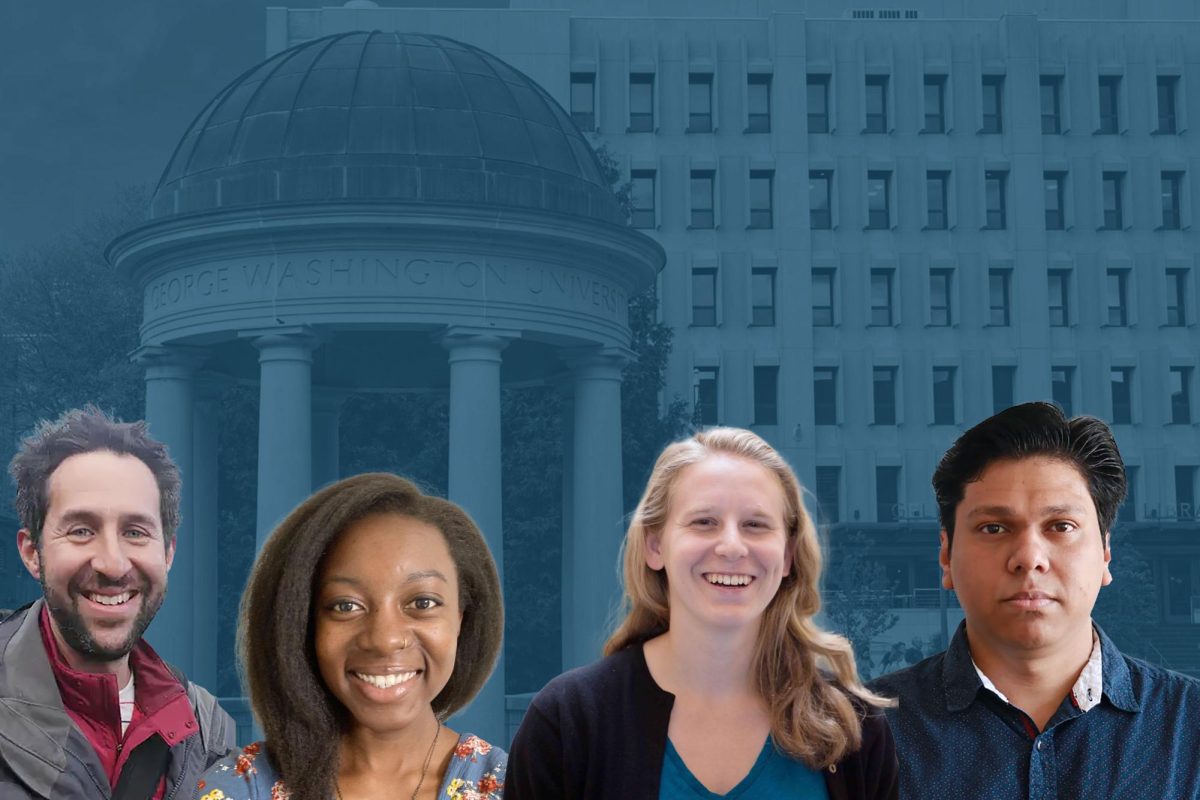There’s nothing quite like the hum of anxiety that radiates through a classroom of first-years on the first day of class.
Whether it’s Principles of Economics I or Introduction to Comparative Politics, you will find a hoard of first-years filing in — hoping to make a friend or two and awaiting the start of their collegiate academic careers. But among the throngs of eager first-years and nonchalant upperclassmen, there is another group of GW community members finding their place on campus this fall: first-year professors.
Professors joining departments across campus said the nerves and excitement of becoming a GW faculty member are reminiscent of beginning college as an undergraduate. As they prepare for the start of the academic year, the new professors said they hope to engage with the District’s cultural offerings inside and outside of the classroom and encourage incoming first-years to do the same.
Jasmine Donkoh, a new assistant professor of biological sciences, said first-year students have many opportunities to socialize through their residence halls and classes, but new faculty have to put in more concerted effort to meet their colleagues and familiarize themselves with the happenings at GW.
“It’s really easy to meet people in undergrad,” Donkoh said. “As a professor, it’s a little harder. You’re coming in on your own. As a freshman, you have this huge cohort of people. And as a professor, I’m the only one that’s new right now. You have to put in a lot more effort to understand what’s going on.”
Compared to the other universities she interviewed for, Donkoh said she was most drawn to GW’s biological sciences department because it had the “best environment.” She said the biological sciences faculty expressed a true desire for incoming professors to feel comfortable in their new positions and for everyone in the department to enjoy working with one another.
“Everyone just truly cares that you’re comfortable here and that you get along with people,” Donkoh said. “They also want to get along with you, because we’re going to work together for hopefully decades.”
Donkoh, who is teaching The Biology of Nutrition and Health and Introductory Biology: Cells and Molecules, said she relates to the homesickness that incoming first-years are likely to experience but encouraged them to get involved with as many organizations on campus as possible to see what sparks their interest.
“Take advantage of being on this campus,” Donkoh said. “There’s so much going on, and we’re part of such a cool part of the country, too, that there’s a lot that you can explore. And I would just encourage everyone to explore it all.”
After moving to D.C. a few weeks ago, Donkoh said she’s enjoying the “infectious energy” of watching Washingtonians out and about in the city every day and living among a more diverse population compared to her hometown of Denver, Colorado.
“It’s really cool to see all these different types of people and hear all these different types of languages being spoken when I’m commuting to work because I take the bus or the Metro,” Donkoh said. “So it really feels like I’m a part of something bigger.”
Eli Kintisch, the incoming Ted Turner Professor of Environmental Media, said after working as a journalist in D.C. for a majority of his professional career, becoming a faculty member at a D.C. university like GW feels like a “natural” fit. Kintisch was previously an adjunct professor at the Rhode Island School of Design and Northwestern University, but his position at GW marks his first full-time teaching position.
“When I taught in the past, it was always additional to my full-time journalism, whereas now my journalism is going to be additional to my full-time teaching,” Kintisch said. “So that’s just a big shift in priorities and outlook.”
Kintisch said he’s been able to embrace his creativity through his new position by designing his Climate Politics, Policy and Media course, which he said will cover the history of climate change activism through the lens of varying media, from books to social media.
“That’s an example of how this job gives a new professor lots of flexibility to try something different that will hopefully engage students who might be interested in the environment, climate and pop culture and media, everything from famous books about the environment to TikTok and Instagram,” Kintisch said.
For the course, Kintisch said he plans to take advantage of GW’s location in the District by having his students report on an event, hearing or speech related to environmental policy this semester.
“GW is an already very rich place for learning, for scholarship,” Kintisch said. “If you’re interested in almost anything, there’s probably classes or events or speakers about it at GW, but the same could be true in Washington.”
After teaching as a visiting assistant professor at GW last year, Sushovan Majhi, who is teaching a Data Science Capstone and Algorithm Design for Data Science, said he decided to apply for a full-time position in the data science program for the 2024-25 academic year since he wanted a more “permanent” position. He said he has primarily taught graduate students in the past, so he feels “intimidated” by the prospect of teaching undergraduates this year but is looking forward to meeting the challenge.
“Previously, I was a postdoc and lecturer at UC Berkeley, so I have experience teaching graduate students, but undergraduates, I think it’s going to be a very different experience from what I have already,” Majhi said.
Lauren Pincus, a new assistant professor of chemistry who is teaching Green Industrial Chemistry, said she’s excited to build relationships with her colleagues and students and see how these interactions lead to future research opportunities.
“Opportunities, I would say, are quite limitless,” Pincus said.
Pincus said entering GW as a new faculty member is “quite similar” to starting at a new school as a student because both experiences involve entering a new academic environment that one must get to know. For the students beginning at GW this semester, she said she advises them to build relationships with their faculty members because they pursued education to help support students.
“Every time that you begin at a new academic institution, whether it’s as an undergraduate, a graduate student, a postdoc, or now as a faculty member, it’s an important aspect to get to know the community that you’re now going to be a part of,” Pincus said.



